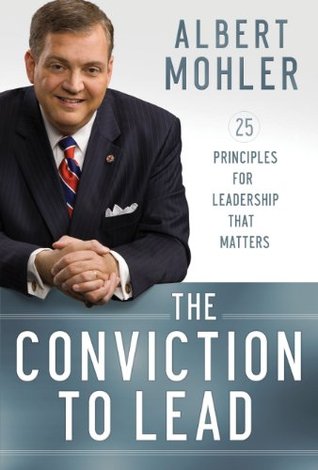More on this book
Community
Kindle Notes & Highlights
Read between
February 26 - March 11, 2014
far too much of what passes for leadership today is mere management. Without convictions you might be able to manage, but you cannot really lead.
Kierkegaard contrasts passion with mere “flashes of enthusiasm.” Passion is not a temporary state of mind. It is the constant source of energy for the leader, and the greatest cause of attraction for followers.
There may be crises and other occasions when the leader has to function as if direction is coming from mere instinct and intuition, but these occasions had better be rare and truly urgent.
One of the most important questions we can ask someone is, “Who has most influenced your life?” Most of us will quickly point to parents, and then to a teacher.
The church is to live by God’s Word and the gospel in such a way that others are left scratching their heads, wondering how people could actually live like this.
Leaders, like all sinners, can be forgiven. But forgiveness does not restore credibility,
We know that character matters when we hire a baby-sitter. How can it not matter when we are calling a leader?
Every single day, the faithful leader must be aware that credibility is the essence of leadership, and that it can be both earned and lost. The effective leader cannot afford to lose credibility—in fact, he needs to stockpile it and build it in reserve.
When the leader enters the room, trust and confidence must enter with him. That is the secret of credibility, and you cannot lead even a Boy Scout troop without it.
Leadership doesn’t happen until communication happens.
The most effective leaders are collectors and connoisseurs of words.
words are powerful when memorable and delivered with conviction.
If a leader has to look for a message, his leadership is doomed. Leaders communicate because they cannot not communicate,
communication is a form of warfare. The leader is always fighting apathy, confusion, lack of direction, and competing voices.
When a true leader shows up, we already know what he is going to say.
Convictions are the product of both head and heart. There is an emotional component to belief, as well as an intellectual component.
Others within the organization can (and often will) have their own say, but the office carries weight and amplifies voice.
Second, the power of office allows the leader to force change within the organization. Don’t get weak knees now. Any leader unwilling to force change is destined for ineffectiveness. The faithful leader uses this power sparingly, but uses it nonetheless.
The truth is that people within an organization feel most secure when the leader leads.
The Christian leader will serve by leading and lead by serving, knowing that the power of office and leadership is there to be used, but to be used toward the right ends and in the right manner.
The leader who allows the unthinkable to be openly considered has sabotaged his organization.
Keep this firmly in mind: Never apologize for having a message and for wanting that message to receive the widest possible coverage and exposure.
I appreciate Stephen King’s candor when he says that the writer’s most important equipment is a room with a door and the writer’s determination to close that door.
The conviction to lead means the conviction to write.
If you are not present on the Internet, you simply do not exist, as far as anyone under thirty is concerned.
If you are satisfied to lead from the past, stay out of the digital world.
Long ago, I developed a habit of wearing a watch with an old-fashioned sweep second hand. I like to hear it tick, knowing that every tick marks the passing of time. I like noisy clocks in my study—clocks I can hear marking the time. I can feel the passing of time in my bones, and that knowledge makes me want to be a more faithful steward of time tomorrow than I was today.
It takes time to see fruit grow on trees, and it usually takes even longer for the fruit of leadership to show itself in abundance.
Remember that leadership is conviction transformed into united action.
Years ago I heard the story of an old preacher who told a group of younger preachers to remember that they would die. “They are going to put you in a box,” he said, “and put the box in the ground, and throw dirt on your face, and then go back to the church and eat potato salad.”
hire on the basis of conviction.
The idea of a long period of unproductive leisure at the end of life is a modern invention, and it flies in the face of the Bible’s exhortation to meaningful work and service for the kingdom.


